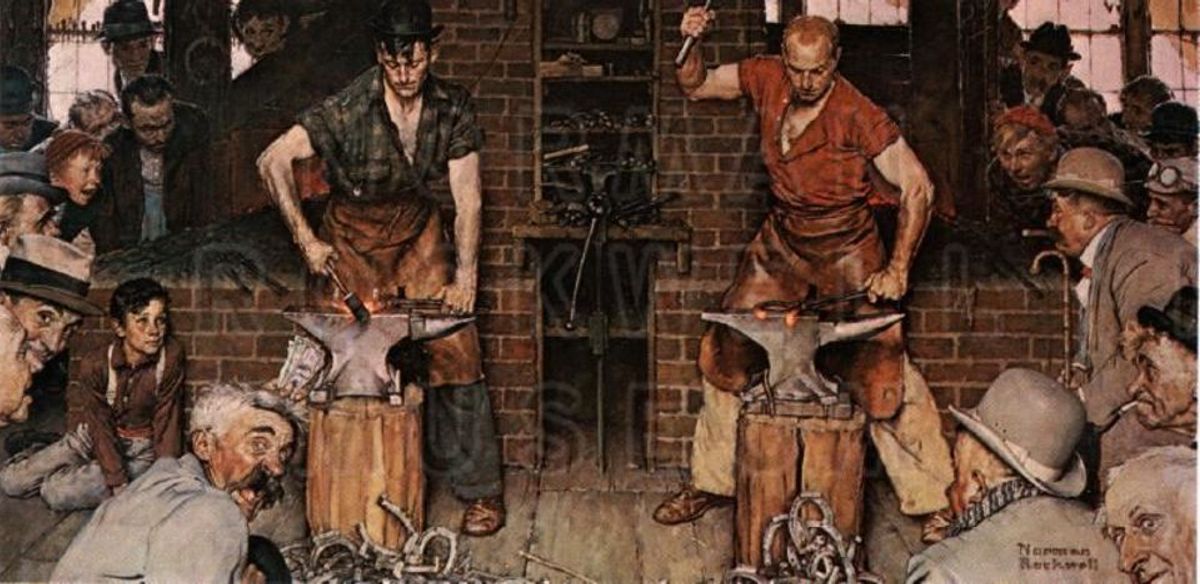A complaint and motion for a temporary restraining order was filed in the Massachusetts Superior Court today (20 October) against the board of trustees of the Berkshire Museum in Pittsfield, Massachusetts, seeking to to block the sale of 40 works of art from its collection. The plaintiffs in the case include Thomas, Jaris and Peter Rockwell, the sons of Norman Rockwell, who object to the sale of two of their father’s works, Shuffleton’s Barber Shop (1950) and Shaftsbury Blacksmith Shop (1940), which the artist gave to the museum. Both paintings are due to be auctioned at Sotheby's New York American art sales on 13 November, and are estimated to make a combined $27m to $40m.
The museum announced plans to sell the works—which are worth an estimated $60m, and include pieces by artists such as Alexander Calder and Frederic Church—last July. The director Van Shields cited an annual deficit of around $1.2m over the past decade as a reason for the sale, with the proceeds to go towards a $40m endowment and a $20m “reinvention” of 114-year-old museum of natural history and art, into a hands-on, interdisciplinary institution with cutting-edge technology.
But the public was not made aware of the decision to sell before the museum entered into the agreement with Sotheby’s, the plaintiffs claim. Their motion argues that the sale of the works would “deprive the residents of Pittsfield and Berkshire County of the cultural and artistic legacy bequeathed to them by their fellow citizens through more than a century of charitable giving”. The museum’s founding statute requires that it maintain gifts “for the people of Berkshire County and the general public”. Court documents also argue that, according to independent financial analysis, the museum exaggerated the claims of financial necessity of the sale and that the Board of Trustees acted in breach of their fiduciary duties and trust.
Michael Keating, the lawyer for the plaintiffs, says that the trustees used “incorrect financial data” in making their decision, and did not pursue alternative plans. “I think they were hell bent to sell this stuff,” Keating says. He believes the board of trustees and the museum’s director, Van Shields, “have taken the absolute easy way out”.
In an open letter published on the Berkshire Museum’s website, the president of the board of trustees, Elizabeth McGraw, wrote that the museum “explored the possibility of a merger with Hancock Shaker Village” in 2015 after the deficit had exceeded $1m, and had tried multiple fundraising “tactics”, such as grant writing, corporate sponsorships and gala revenue. “If we do not transform the museum into a sustainable, thriving institution, it will eventually close,” McGraw wrote.
“We are confident that the Museum has the right to go forward [with the sale] and that the lawsuit is factually and legally flawed,” William F. Lee of WilmerHale, the attorney who represents the Berkshire Museum, said in a statement responding to the motion for a temporary restraining order. “We will respond to the claims in court.”
According to Keating, courts will sometimes issue a temporary restraining order if plaintiffs can show they would suffer “irreparable injury” without it. In this case, he says this injury would be the sale of works to individuals or institutions outside of Massachusetts, particularly abroad, in which case the community would not have access to them. “There is evidence that some of the works have already been removed to locations outside the Commonwealth [of Massachusetts], including to Texas,” the motion states. Keating explains that works from the planned sale were spotted in photographs of a recent event at Sotheby’s in Texas.
If granted, the duration of the temporary restraining order would be up to the courts.
In a statement, Sotheby's said that it has “reviewed the lawsuit filed against the Berkshire Museum and is confident that the claims are legally and factually flawed. We fully expect the court to confirm that the Museum’s Board of Trustees acted in accordance with its fiduciary duties and that the museum is well within its rights to deaccession and offer these works for sale. We are looking forward to successful auctions that will ensure the future of the Berkshire Museum.”
“We believe we have strong legal grounds for our deaccessioning and we are confident in our New Vision plan which will allow this important local museum to continue to contribute to the educational and cultural life of this region for another century,” McGraw said in a statement in response to the motion. “Berkshire Museum provides unique educational experiences for local children, and will continue to make its extraordinary collection accessible to the community as we take the next steps needed to secure the future of this museum as a center of interdisciplinary, interactive learning true to the vision of founder Zenas Crane.”


